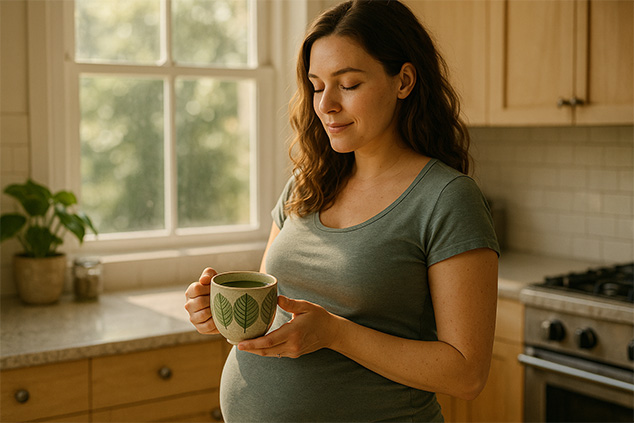Over the past years, at least a few news reports have raised awareness of the use of kratom during pregnancy. They indicated that newborns of mothers have displayed withdrawal symptoms similar to those resulting from opioids.
Therefore, this has caused various health professionals and other sources to urge pregnant women not to take kratom. Yet, are the consequences of taking kratom during pregnancy as dangerous as they are claimed? Let’s investigate.
What Is Kratom?
A tropical tree from Southeast Asia, kratom leaves have numerous beneficial alkaloids and other compounds. Due to them, kratom has been used for its medicinal properties in the Southeast Asia for centuries.
Not all kratom is the same. Depending on the circumstances such as the amount of sunlight and hydration that kratom leaves receive, they develop different levels of alkaloids. As a result, not only the stems and veins of these leaves are different, but the leaf matter produces different effects.
Kratom leaves naturally develop three different vein types: red, green, and white. Red vein kratom has potent pain-relieving, euphoric, and sedating effects.
White vein kratom is the exact opposite. It acts in a similar way coffee does, providing alertness and energy and improving focus and productivity. White vein kratom can also significantly boost the mood as well as has mild analgesic properties. Surprisingly, this is not the only similarity kratom has with coffee. Both herbs come from the same plant family.
Green vein kratom offers a mix of the two – moderate relaxing and pain-relieving as well moderate energizing effects.
Though kratom leaves have many alkaloids, two of them come in the most abundant quantities, shaping the overall profile of kratom. These are mitragynine and 7-hydroxymitragynine.
Kratom alkaloids affect the same receptors in the brain, though they do not engage them in the exact same way.
Therefore, kratom possessed opioid-like properties and can serve as a substitute to prescription and other opioids, yet, it’s not an opioid itself. Kratom does not belong to the opioid plant family, but rather to the Rubiaceae or coffee family, as mentioned above.
While this makes kratom an alternative to opioids and helps people overcome opioid addiction, it also brings a lot of negative and often unfounded fame.
Why Do People Take Kratom
Different varieties of kratom have various uses. So, people take it to relieve strong chronic pain, improve sleep, quit opioids, increase energy and focus, improve the mood, and much more.
Medication during Pregnancy
In general, doctors advise pregnant women to avoid taking medication unless it’s absolutely necessary. This is especially important during the first three months. That’s because all vital baby’s organs develop during this time.
Yet, not all medicines are bad. Some are safe to take during pregnancy. So, it’s important to discuss with a doctor and follow their recommendations when it comes to medicines during pregnancy.
Medicines that Are OK during Pregnancy
Certain medications are safe during pregnancy. These include:
- Most asthma medication
- Some depression medication
- Some allergy medicines
- Certain heart burn medicines
- Some high blood pressure medicines
- Certain antibiotics
- Some over-the-counter medicines such as Tylenol
Medicines to Avoid during Pregnancy
However, there are also medicines that you should definitely avoid, such as:
- Pepto-Bismol or other medicines that contain bismuth subsalicylate
- Decongestants like phenylephrine and pseudoephedrine
- Cough and cold medicines with guaifenesin
- Aspirin, ibuprofen, naproxen and other pain medication
- Isotretinoin containing acne medication
- ACE inhibitors
- Valproic acid and some other anti-seizure medication
- Some antibiotics, for instance doxycycline and tetracycline
- Methotrexate, which is sometimes used to treat arthritis.
- Warfarin
- Lithium for bipolar depression
- Alprazolam and diazepam used for anxiety.
- Paroxetine for depression
Keep in mind that this is not medical advice, but simply a guideline. Always talk to your doctor about any medication that you may be taking if you are pregnant or are planning a pregnancy.
Substances to Avoid During Pregnancy
Pregnant women should abstain from the use of alcohol, drugs, as well as shouldn’t smoke.
When it comes to opioids, those too should be avoided as they can negatively affect both the mother and the baby. Opioid use during pregnancy can lead to poor infant growth, preterm birth, stillborn birth, maternal death, birth defects, as well as Neonatal Abstinence Syndrome which is withdrawal in babies.
Pregnant women are either advised opioid use that follows a strict schedule, or, they are advised to quit opioids using medication to facilitate that. However, the medication used to quit opioids can also lead to dependence and other negative outcomes.

Kratom during Pregnancy
Since opioid use has many side effects and opioids may even not be effective for certain kinds of chronic pain, many people choose alternative pain management methods, such as kratom.
Yet, pregnant women often are fearful about the effects of kratom on their unborn child’s health and development. News reports can make things even worse.
While the mother and the baby have different blood streams, the baby depends on the mother for oxygen and nutrients.
The nutrients and oxygen from the mother’s blood go through the placenta and access the baby via the umbilical cord. Then, the carbon dioxide and any waste products leave the baby via the umbilical cord and are eliminated through the mothers blood circulations.
Since kratom is digested and absorbed into the blood, it too can access the baby in the same way as any other substances can. The fetus absorbs the nutrients it needs before the mother does, therefore, the baby would also be exposed to kratom.
Yet, how bad is it?
Can Kratom Affect the Baby?
Despite the reports on kratom withdrawal symptoms in babies, there are also many women who do not experience any problems or side effects. Moreover, the cases that do reach the news feature heavy kratom use that is not recommended in general.
Keep in mind that the developing baby is very small, and it does not need as many calories and nutrients as an adult. So, a regular kratom dose can be immense for a fetus, such as a large coffee dose, which is why pregnant women are advised to only take one cup of coffee a day. Too much coffee can lead to low birth weight or can even cause miscarriage.
Nonetheless, studies on kratom are very limited at the moment. Even though many women report no negative side effects, it is unknown how kratom could affect babies in the long term.
The Bottom Line
There are not enough studies to conclude whether kratom during pregnancy is safe or not. Therefore, to avoid any unknown complications its best to quit kratom during pregnancy until we have more information on it.
Do you think kratom is safe during pregnancy? Why or why not?



Leave a Reply